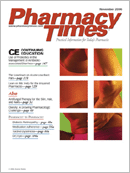Publication
Article
Pharmacy Times
Patients Should be Chosen Wisely for Newer Treatments
Author(s):
The release of novel agents fordiabetes management has resultedin important advances forpatients whose blood sugar is poorlycontrolled despite optimal treatmentwith previously available oral or injectabledrugs. Careful patient selection isrequired for these newer medicines,however, in order to maximize therapeuticoutcomes while minimizing the potentialfor adverse events. Pramlintide,exenatide, and inhaled insulin are recentadditions to the list of diabetes drugs.
Pramlintide
Pramlintide (Symlin), an injectableamylin analog, is approved by the FDA foruse in adults with type 1 or type 2 diabetesusing insulin. It is designed to begiven immediately before major meals(>30 g carbohydrates) in addition to aninsulin bolus.1-3
Patients must monitor blood glucosecarefully when using pramlintide. Mealtimeinsulin doses are reduced by 50% atthe start of therapy, then adjusted asneeded.4 Doses of pramlintide are titratedbased on whether or not the patientexperiences persistent nausea. The productlabeling highlights patients who arenot candidates for treatment.4 Theseinclude patients who:
- Are poorly compliant with their currentinsulin regimen
- Have no awareness of hypoglycemia
- Are poorly compliant with glucosemonitoring
- Have a hemoglobin A1C >9%
- Have a confirmed diagnosis of gastroparesis
- Require drug therapy for gastroparesis
- Have had episodes of hypoglycemia thatrequired assistance in the past 6 months
- Are pediatric patients
Pramlintide prescribing informationcontains a black-box warning regardingthe risk of hypoglycemia.
Exenatide
Exenatide (Byetta) is an injectableincretin mimetic that enhances insulinsecretion, restores first-phase insulinresponse, and suppresses glucagonsecretion. It reduces food intake andslows gastric emptying. Exenatide isdosed twice daily and is titrated upwardsover 1 month from a 5-mcg to a 10-mcgdose based on the patient's experiencewith nausea. Patients should be advisedthat treatment with exenatide may resultin a reduction in appetite, food intake,and/or body weight, and that there is noneed to modify the dosing regimenbecause of these effects.5 A prefilledinjection pen simplifies administration.
Exenatide should not be used inpatients with type 1 diabetes or for thetreatment of diabetic ketoacidosis. It isnot a substitute for insulin. Use of exenatideis not recommended in patientswith end-stage renal disease or severerenal impairment, or in patients withsevere gastrointestinal (GI) disease. Itshould be used with caution in patientsreceiving oral medications that requirerapid GI absorption.5
Inhaled Insulin
The third new agent, insulin human[rDNA origin] inhalation powder (Exubera),has recently been approved bythe FDA. The drug is the first inhaled,noninjectable insulin option available inthe United States. Clinical trials showedthat inhaled insulin was as effective asshort-acting injectable insulin for achievingglycemic control in adults with type 1and type 2 diabetes. Addition of inhaledinsulin to oral medications in type 2 diabetesalso resulted in better glucose controlin patients who were poorly controlledon oral agents alone.6-8
The benefits of inhaled insulin from apatient acceptance standpoint are clear.Inhaled insulin may replace short-actinginsulin in some patients, or provide betterglucose control in patients who areafraid of injections. Inhaled insulin requiresa special device, however, that ismuch larger than standard inhalers. Theprocess of administering the doserequires several steps, which require acertain degree of dexterity. The inhalermust be cleaned regularly.
Use of the inhaled product is not recommendedin patients who have chroniclung diseases.9 It is contraindicated inpatients with poorly controlled or unstablelung disease, because variations inlung function can affect absorption andincrease the risk for hypoglycemia orhyperglycemia. Blood glucose should bemonitored closely during respiratory illnessesthat occur while inhaled insulin isbeing used. Because of concerns aboutthe long-term effect of inhaled insulin onlung function, the manufacturer recommendsa lung function test at the beginningof treatment, at 6 months of therapy,and then yearly if lung function is stable.Inhaled insulin is contraindicated forpatients who smoke or who havestopped smoking in the past 6 monthsbecause of an increased risk of hypoglycemia.
Dr. Garrett is a clinical pharmacistpractitioner at Cornerstone HealthCare in High Point, NC.
For a list of references, send a stamped,self-addressed envelope to: ReferencesDepartment, Attn. A. Rybovic, PharmacyTimes, Ascend Media Healthcare, 103 CollegeRoad East, Princeton, NJ 08540; or send ane-mail request to: [email protected].







